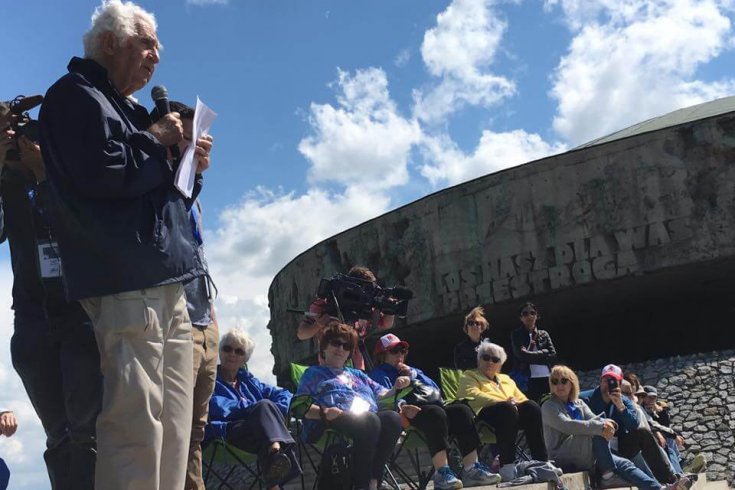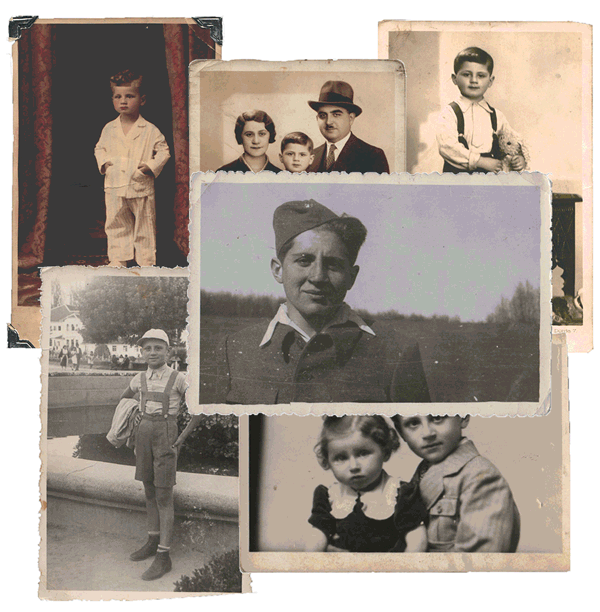When a Nazi camp guard tossed the leftovers of a snack onto the dirt near Bill Glied, a Jewish thirteen-year-old who was sawing down pine trees in the summer of 1944, Glied did not know if the guard was littering or giving him food.
The guard’s motives did not matter to Glied as much as the morsel. Glied, who came from the city of Subotica in what was then Yugoslavia, was imprisoned in Kaufering III, a subcamp of Dachau concentration camp. Hunger gnawed at him nonstop. It started at 4:30 a.m. when he was awoken on a wooden platform in the barracks where he slept crammed together with over 100 other prisoners. At around 5 a.m., they had breakfast—a mug of coffee that was barely more than murky water—then marched for an hour to Igling forest.
The prisoners spent the next twelve hours helping construct Weingut II, a partially subterranean aircraft factory. The prisoners heaved fifty-kilogram sacks of concrete mix. If the scaffolds they were working on broke, they plummeted and died. During the winter, Glied’s fingers froze as he bound rods with steel wire. And, when work ended, their dinner was soup. It sometimes contained rotting potatoes and often had beet pulp. Glied could not eat it when he first arrived in Dachau, although he soon scooped up the residue of it from his bowl with his finger. A slice of bread accompanied the soup, and if you were wise, you saved it for the morning, sleeping with it under your head so no one would steal it. (And, if you were so desperate that you were caught stealing someone’s bread, Glied recalled that prisoners would materialize in the night and smother you to death with a blanket).
So when the scrap of food landed near Glied, he snatched it up and ate it, not thinking about whether it was a fluke. Nor did he wonder whether the guard was an SS officer or an injured Wermacht soldier from the front. Mostly, he thought about how to keep an eye on the middle-aged man with a stoic stare who resembled Glied’s own father. Where is he sitting? Glied asked himself, scanning the hillside where he and about 100 others sawed down trees, dug up earth, and dragged logs. When he spotted the Nazi, often resting with his rifle wedged between his legs on a tree stump, Glied approached him.
The Nazi sometimes made eye contact with Glied as he ate and other times ignored him before tossing the remnants of his snack aside. He cast away apple peels, which remained vivid in Glied’s memory because they were so momentous, “like a piece of chocolate.” The Nazi sometimes glanced from Glied to the food on the ground and nodded toward it. This covert arrangement lasted for about two to three weeks, until the guard disappeared, likely assigned to another group.
When the American army liberated Dachau in April 1945, Glied, then fourteen, weighed around eighty to ninety pounds. Decades after immigrating to Canada as a seventeen-year-old orphan, Glied remembered the Nazi’s behaviour “as clearly as anything” because he had long puzzled over the contradiction inherent in a German soldier secretly feeding a Jewish prisoner starving in a concentration camp.
Glied and I spoke about that contradiction at his Toronto home shortly before he died of what was likely a heart attack on February 17, 2018. I had first come across him in November 2017, at Ryerson University, when I attended a speech of his about surviving the Holocaust. Hearing the story of the Nazi sneaking Glied food had been incredible and mystifying, and for weeks afterwards, I had asked myself big, vague questions about what it suggested about the psychology of morality. I arranged an interview with Glied.
As I researched for our conversation, I realized just how much Glied had made educating younger generations about the Holocaust his mission in his later life. After his daughter—then a child—asked him why she had no grandparents, he felt morally obligated to remind people of their duty to stand up to evil. This sense of duty led him to give speeches across Canada and as far away as Poland, where he spoke to Jewish youth visiting the sites of death camps. Toward the end of Glied’s life, an increasing sense of urgency animated his mission. “I’m studying history all the time,” he told the CBC in March 2017, as antisemitism and populist nationalism were spreading throughout the West. “And what is happening now is so reminiscent of what was happening in Europe in the 1930s.”

But Glied maintained an optimistic view of human nature, despite the fact his father, mother, and eight-year-old sister died in Auschwitz and Dachau. “I don’t think people are bad,” he once said in a speech. “I think people are made to be bad because of circumstances, because a few other people are suggesting them to be bad.”
Glied brought up his tendency to view people as essentially good when we sat together in front of a wall of books in his basement office. Glied was tireless, both an eighty-seven-year-old businessman still so busy that scheduling interviews was difficult and an insomniac who read late into the night. His daughter Sherry estimated he read about three books a week, ranging from the works of philosophers like Viktor Frankl and Epictetus to literary greats like W.G. Sebald and Primo Levi. He had read close to every book about the Holocaust, said his wife, Marika, and grim titles like The Essential Hitler framed Glied’s face as we spoke.
A perplexed smile came over his face as he told me that he leaned toward the conclusion that the Nazi had fed him because the Nazi pitied a starving thirteen-year-old boy. But Glied remarked that the Nazi could have been toying with him out of morbid curiosity. “Maybe it’s an interesting thing, you know,” he said. “There is this little mouse, and I want to feed him, even though I put a mouse trap out there.”
While the Nazi’s motives for feeding Glied are unknowable, they aren’t necessarily inscrutable. Like many participants in mass murder, the guard might have been a regular person who, to quote Glied, was “made to be bad because of circumstances, because [of] a few other people.” Understanding what might have motivated the Nazi can help us recognize our own potential for evil—and for resisting it.
James Waller is a psychologist of genocide who teaches at Keene State College in New Hampshire. His book Becoming Evil: How Ordinary People Commit Genocide and Mass Killing, in part explores the crucial role that interpersonal forces play in influencing everyday people to kill. So, when analyzing what may have led the Nazi to give Glied food, “we can’t discount the fact that he was alone,” Waller told me over Skype.
Individuals, argues Waller, are often pressured by peers into participating in a genocide. They also offload the responsibility for their actions onto their leader, saying, for example, that they were “just following orders.” A perpetrator who conforms to peer pressure and blames his higher-ups for his actions can also feel less like an individual and more like an anonymous part of a group. In this psychological state, called “deindividuation,” the person adheres to group norms more and pays attention to their personal moral standards less, which can, under certain conditions, make them more aggressive.
Since the Nazi was alone, no fellow guards were pressuring him into conforming to Nazi protocol, and he was perhaps more self-aware, making it harder to blame someone else for his actions, Waller said. “This guard sounds to me like someone who wasn’t a committed ideologue.” When “an opportunity presented itself to do something human, and he could do it with little cost, he did it.”
Waller’s emphasis on the importance of social interactions and situations in driving a person to kill may give the impression that people are fundamentally spineless. But defiance is always possible: “I always emphasize the role of human agency in perpetrator behaviour, that they chose to do what they did,” Waller said. He believes that “if human agency can be exercised to perpetrate atrocities, human agency absolutely can be exercised in defiance.”
Waller has done about 225 face-to-face interviews with alleged and convicted perpetrators of massacres and genocides in Rwanda, Argentina, the former Yugoslavia, and Guatemala. In his experience, perpetrators occasionally act kindly toward a victim who is “someone who reminds them of a child, someone who reminds them of a former lover or friend,” Waller said, before noting that the parallel with Glied seeing his father in the Nazi was interesting. “There was just something about Bill Glied that was a point of human contact for this guard.”
Such behaviour is “both unusual and not unusual,” said Christopher Browning, one of the foremost historians of the Holocaust. The encounters between the Nazi and Glied reminded Browning of incidents in his book Remembering Survival: Inside a Nazi Slave-Labor Camp, which recounts Jewish prisoners’ harrowing struggle to stay alive in labour camps in Starachowice, Poland. In particular, Browning sees parallels between the Nazi’s interactions with Glied and the way that a Starachowice camp guard, Bruno Pappe, took a liking to a young Jewish prisoner. Pappe allowed the youth to arrange for prisoners who risked mistreatment or harassment to find refuge in a forge. “These people are very rare,” Browning said, referring to the camp guard, “but, nonetheless, they are there in almost every labour camp.”
Similar instances of perpetrators contravening orders and helping victims were recorded among small subsets of American soldiers in Vietnam. In the infamous Milgram experiment—where people obeyed instructions to shock a volunteer even after they thought the volunteer was dead—some participants were defied the orders. What Glied experienced may have simply been one small example of a more general human capacity to push back against evil.
Promoting that capacity by turning today’s potential bystanders into tomorrow’s rescuers was one of the main reasons why Glied travelled the country. “I’ve learned, subsequently, after studying the Holocaust,” he said during the 2017 speech at Ryerson University, “that my mom and dad, my sister, could have been saved, if…people would have stood up and stood according to their convictions instead of taking the indifferent, bystander position.”
Glied’s family could only bring one small package of belongings when they went to meet other Jews in a large square in front of the looming steeple and red walls of Subotica’s art nouveau city hall. The day before, the Hungarian government occupying Yugoslavia had given the Jews a day’s notice that they would be relocated somewhere in eastern Europe. Now they were gathering, clutching packages, nearly every one containing photographs of holidays, happy moments of community life, or children.
They eventually shuffled out of the square and through the streets, lined on both sides with onlookers: kids who had been Glied’s friends, customers of his father’s flour mill, family friends who had dined and celebrated with Glied’s family. Some people spat.
“No one said a word,” said Glied, with a trace of anger in his voice, during a talk he gave at the Cathedral of the Holy Family in Saskatoon, in March 2017. “No one said, ‘Good luck.’ No one said, ‘I’ll hide you.’ No one said ‘Goodbye.’”
Then they arrived at a train station, where cattle cars took them to the death camps at Auschwitz.
“Make sure your friends know they can count on you,” Glied said. “That you will not become a bystander.”
Why some people become rescuers instead of bystanders and perpetrators is hard to say. Like the guards who sometimes disobey orders, rescuers may be particularly empathic. Being independent minded likely plays a large role. Poles who hid Jews during the Second World War tended to be outsiders with an individualistic streak who did not base their morality entirely on cultural norms. “When the Jew knocked on their door, they were psychologically prepared to do something the community did not support,” Browning said.
In speeches, Glied seemed to urge his audiences to embrace the qualities of empathy and independent-mindedness and to reject a world view that emphasizes superficial differences between people over their shared humanity. This is not always easy, argues Waller, given that humans have evolved to be tribal. Xenophobia, ethnocentrism, and the desire for one’s group to be socially dominant are not merely the characteristics of fascistic ideologies. They are, evolutionary psychologists suggest, latent feelings that evolution has ingrained into humans over many thousands of years during which we competed against each other in groups for limited resources—sometimes to the death. Groups with xenophobic, ethnocentric, and domineering tendencies likely outcompeted—or eradicated—groups whose members were not as xenophobic and ethnocentric.
This doesn’t mean that human nature has condemned people to slaughter one another, however. Donald Dutton is an emeritus psychology professor at UBC who specializes in the psychology of violence. He notes that the criteria for membership in a group change over time and that this may offer humanity a glimmer of hope. “All the distinctions we make to define tribes,” Dutton told me, “they’re all things that we’ve made up.” Diverse societies exist around the world, Dutton notes, most often where there is an overarching identity everyone can belong to, the way that a Yugoslavian national identity managed to unite Serbs, Croats, and Bosniaks for decades. “We need, if we are to survive,” he wrote in his book The Psychology of Genocide, Massacres, and Extreme Violence, “a sense both of humanity as a tribe and of humanity’s potential for radical violence.”
Glied viewed humankind this way, as a single tribe. “I’m a Jew,” he said to the Toronto Star in 2016, “because I believe that all human beings are created in the likeness of God and therefore all racism is foreign to me.”
Payam Akhavan, a human rights lawyer who has helped prosecute mass murderers at the Hague and author of the bestseller In Search of a Better World: A Human Rights Odyssey, said that Glied’s statement expresses a religious version of the belief underlying human rights: that humankind is fundamentally interconnected. The kind of belief Glied voiced would make people “less wont to be the bystander, let alone the perpetrator,” Akhavan told me. “We must see all human beings as members of one indivisible race.”
Akhavan believes that more people will adopt a rescuer mindset if societies undergo a moral evolution based on a belief in the oneness of humankind. “I’m not sure whether the law is the best instrument for inculcating those values in our consciousness,” Akhavan said. “I speak as a former UN prosecutor who would like to say the law is everything, but the law isn’t everything. At least not the law in the human sense of laws, as opposed to higher, spiritual laws.”
How did he envision such change would come about? “It begins with random acts of kindness,” he said.
“Make a promise today, that just today you will do a small, good thing,” Glied said at the end of his 2017 speech in Saskatoon’s Cathedral of the Holy Family. He was speaking to about 2,000 people, mainly schoolchildren. About another 1,000 were watching him on a livestream. “Not something big. Help mum with the dishes. Help a friend with an essay. Because imagine if all Canadians—36 million of us—would do a good thing today, that will be enough to change this world into a better place to live in.”
Although Glied urged his audiences to improve the world one good deed at a time, he worried the world was taking a turn for the worse. Attitudes and political movements that Glied found hauntingly familiar had been spreading once more: across the West, a recent rise in antisemitic attacks and a shift toward authoritarian populism had made Glied look to the past to understand the present.
Glied “was very upset about the current political landscape,” Sherry said, sitting with her two sisters, Tammy and Michelle, and mother, Marika, at a dining table in Glied’s home a few weeks after his death. Glied was particularly disturbed by recent events in Poland, Marika said. The tens of thousands who marched through Warsaw to mark Poland’s independence day on November 11, 2017, many of whom where far-right nationalists, made Glied feel as if “it was going back to what it was before,” Marika continued.
He also “did not like Trump,” Sherry said. I had gleaned this from Glied myself: I had asked him what he thought about the comparisons often made between Trump and Hitler. Glied replied that he “can’t help but detect some innuendo” in the US president’s tweets and speeches.
Glied’s concern about the state of the world led him to pore over newspapers and watch the news often. “I was not allowed to phone between ten and eleven because that was when Fareed Zakaria was on,” Sherry said, then laughed. He obsessed over the news in part because, while he didn’t blame his parents for their fate, “he wondered at various times why they hadn’t left Yugoslavia.” He wanted to know “whether he would know for us whether it was necessary to leave somewhere. Should he worry?”
In August 2014, Glied began a speech outside a Hebrew day school in Toronto by describing the toll that monitoring the world so closely took on him: “I am among the last survivors of both Auschwitz and Dachau, and sitting in my secure Canadian home, I watch the news broadcasts, and I cry,” Glied said, his bushy, grey eyebrows furrowed in an angry frown as rain fell on the approximately 4,000 members of his audience.
Glied’s speech was part of the closing remarks of a demonstration against antisemitism and the vilification of Israel. The demonstration came at the end of a summer that saw outbreaks of antisemitic violence and rhetoric in Europe, tied in part to the 2014 Israel-Gaza conflict.
But 2017 and 2018 have been in some ways even worse for Western Jews. After a Syrian migrant in Berlin used his belt to whip a young man wearing a kippah in early 2018, the president of the Central Council of Jews in Germany implored Jews to stop wearing kippahs for their safety. In response, Aviv Zonabend, a city councillor in Toulouse, France, said, “The future of the Jewish people in Europe is hopeless.” Zonabend’s pessimistic prediction came against the backdrop of the brutal murder of a Parisian Holocaust survivor in late March and the release of French police statistics showing that 2017 saw a 26 percent increase in antisemitic incidents from 2016.
After Trump’s 2017 decision to move America’s embassy in Israel to Jerusalem, a synagogue in Gothenburg, Sweden, was firebombed and there was a protest in Malmö where people chanted, “We want our freedom back, and we’re going to shoot the Jews!” In Canada, B’nai Brith registered 2017 as the second year in a row where incidents of antisemitism have broken records, and in the United States, the FBI reported a 37 percent jump in incidents of antisemitic hate crimes between 2016 and 2017. Then, in October 2018, eleven Jews were murdered at Pittsburgh’s Tree of Life synagogue in what was likely the deadliest antisemitic massacre in US history.
The resurgence of antisemitism and populist nationalism over the last several years led Glied to tell the CBC, right before his speech at the Saskatoon cathedral, “I never expected at this age that I would see the world turning again.”
After Glied had finished his speech, a child asked, “If you could go back in time, what would you do to change the course of history?”
Glied’s eyebrows rose with surprise, his mouth pursed into a smile, and he closed his eyes for a moment and bowed his head. Then he said, “I’m not that smart or that intelligent to be able to change these terrible things that are happening in the world. But, but,” he continued, a look of earnest sincerity replacing the humour in his eyes, “I would try to urge everybody to think, and after they thought out—as I feel they must think the right thing—to do what they are urged to do, to do the right thing.”





